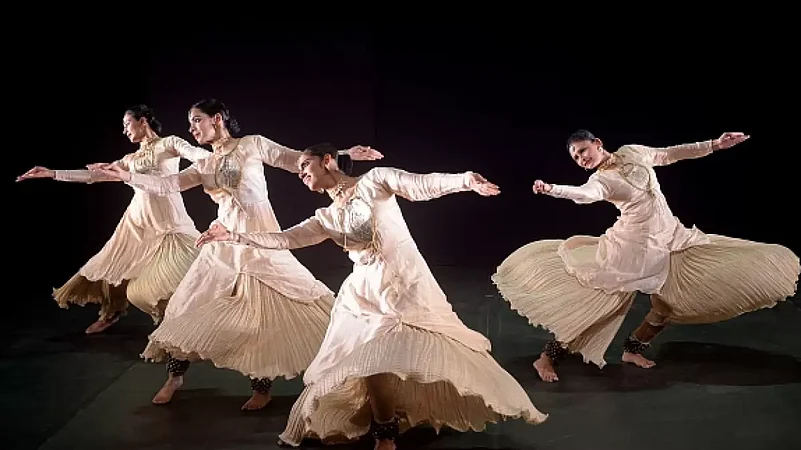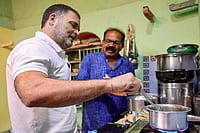In?the final scene of ‘About Ram’, a theatre piece directed by acclaimed puppeteer Anurupa Roy, Dasharath's son Ram is completely alone, seated on the throne with?the coveted raj mukut. Sita is not with him. Questions swirl in front of the audience: What is Ram’s existence without Siya? Is the attainment of power the only goal? Recently staged at the 44th Vikram Sarabhai International Festival—a three-day annual arts festival held in the memory of Vikram Sarabhai— ‘About Ram’ mesmerised the audience at the beautifully designed Natarani Amphitheatre of Darpana.
Darpana At 75: A Beacon Of Artistic Courage And Vision
Situated on the banks of the Sabarmati River, close to the serene Gandhi Ashram in Ahmedabad, 'Darpana' was established in 1948. The institute has completed seventy-five years of existence.

Situated on the banks of the Sabarmati River, close to the serene Gandhi Ashram in Ahmedabad, 'Darpana' was established in 1948. The institute has completed seventy-five years of existence and it epitomises Mahatma Gandhi’s ethos of pluralism. Accomplished dancer Mrinalini Sarabhai and renowned scientist Vikram Sarabhai were the fulcrum around which it flourished initially and today, under the tutelage of their daughter Mallika Sarabhai, it bravely continues to reflect and analyse social reality through the arts. ?
Although it started as an institute for the performing arts, later on, it included drama, music, puppetry and martial arts. It has successfully trained students, welcomed art?aficionados from various?nationalities?across the world and become an international centre for multicultural arts and ideas in India. Mrinalini once said,?“When Darpana was founded, it was regarded as a cultural oddity and a curiosity in the industrial city of Ahmedabad where artistic activity had hardly any place. But my husband Vikram kept telling me that someday Darpana would have a strong influence in Gujarat.”?
He was right of course. The Amphitheatre at Darpana was packed when ‘About Ram’ was staged. The audience consisted of people of all ages, including children. The play is extremely topical. It is not about Lord Ram, but ‘Purushottam’ Ram. With the inauguration of the Ram Temple this month in Ayodhya, the Hindi public and political sphere is agog with intense activities. These activities are also being linked to the Lok Sabha elections to be held later this year. Political Ram dominates the discourse over spiritual Ram! Religion is no longer a private matter; it has the support of the State. It is not without reason that posters of ‘Rajtilak ki Karo Taiyari, Aa Rahi Hai Prabhu Ram ji ki Swari’ are seen at many places in Ahmedabad.
In our time, the debate around the plurality of cultural forms has become extremely difficult. Interpretation and reinterpretation of myths is not easy. The story of Ram has been told in more than three hundred ways. Many different forms of Ram Katha are also prevalent in oral traditions which have not been written down. However, in north India, Ramcharitmanas written by poet-saint Tulsidas hold sway over the masses.
Ram’s story remains the same and it has been?recounted many times, but the craft of storytelling sets apart ‘About Ram’, which has modern connotations. The special feature of this play was the movement between different forms of art such as puppetry, animation and acting. The artists onstage were successful in bringing the main characters of Ramayana, Ram, Sita, Hanuman and Ravana vividly to life before the audience through puppetry and brilliant acting. The usage of sound and light was skillfully done. The director, Anurupa, was present on the stage with the puppets and actors.?
***
At Darpana, the emphasis in the initial decades was on classical dances, but in the late 60s, the teaching and training of modern theatre and puppetry were formally started here, the credit for which goes to Kailash Pandya, Damini Mehta and Mehar Contractor. Renowned puppeteer Dadi Pudumjee was trained in puppetry at Darpana Academy.
When dancer, actor and activist Mallika Sarabhai was appointed the director of this organisation in 1977, the discussion of social change through art came to the centre of Darpana. The organisation also associated itself with development and communication. Thousands of students were trained here through performances in India and abroad. The organisation made an effort to take its presentations to ordinary people. In keeping with the times, there is a natural fusion in them between various forms of art, media as well as technology.
The 44th Vikram Sarabhai International Festival showcased Darpana’s social commitment through the medium of the arts with verve. Shakespeare’s famous play, 'Macbeth', was also staged during the festival. Directed by Massimiliano Troiani with Mallika Sarabhai, this play too had glimpses and echoes of political issues of the country and the world like ‘About Ram’. Today, when art has distanced itself from political issues, Darpana stands out as a beacon of artistic courage and vision.?

























